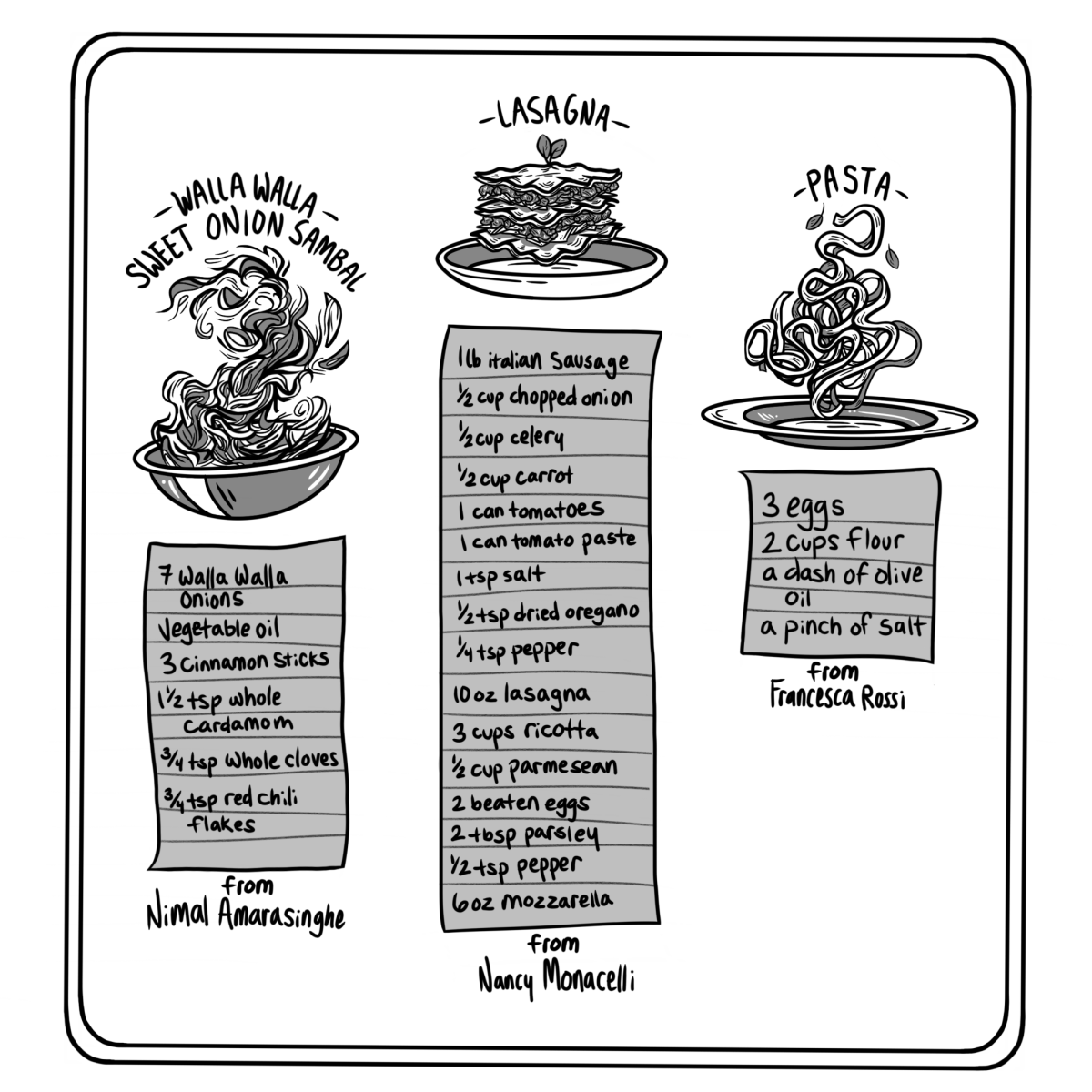At almost any given time, a group of music majors can be found talking in the Hall of Music hallway or slaving over homework in the music library. From striking up conversations about theory, to performing, to composing quintets at 3 a.m., all of these students have a commitment to the music department that goes beyond simply getting their homework done.
Music majors focus their degrees in general music, performance, history or theory/composition. Depending on which track they choose, music seniors must take four written exams, an oral and an aural, in addition to either performing a recital or writing a thesis. All music majors are required to take lessons and get involved in an ensemble for at least part of their time at Whitman College.
Because they have such multifaceted requirements, music majors are often involved in several different musical activities simultaneously. For example, senior music composition major Erik Feldman composes, sings, plays three instruments and performs in four student ensembles.
With so many recitals and lessons to prepare for, his daily life revolves around his rehearsal schedule.
“I try to practice half an hour for every instrument every day. Chorale or chamber is sort of my starting point, and then I practice; I might have orchestra in the evening. I’ll probably do a bunch of homework and then I’ll work on composition late at night,” said Feldman.
Fellow senior composition major Will Ekstrom composes, sings, conducts and performs in chorale and chamber.
“There’s a lot more to being a music major than learning your notes … I try to get an hour daily for piano and voice, conducting goes in about every other day, and, well, I like to think of composition as trying to get lightning to strike twice. Sometimes you’re up until 3 a.m. because you had a good idea,” said Ekstrom.
Junior music performance major Karl Mering is also very busy. In addition to practicing piano and taking lessons, he is working on requirements for his English major and competing with the varsity swim team. In order to better manage his time, he keeps a healthy perspective.
“I just feel like there’s more time than people realize,” he said. “You always hear about those musicians who learned 40 Bach preludes in one month, and you realize what people are capable of doing when they really focus on something.”
Each major focus has its own unique challenges and rewards. Music composition major Feldman has spent plenty of late nights trying to figure out exactly how he wants a piece to sound.
“You always have the best ideas when you don’t have anything to write them down with,” said Feldman. “Or you wake up at six in the morning and say, ‘That was a brilliant idea in my dream. What was it?’ ”
Feldman has written a variety of pieces, ranging from a piano-cello piece about walking through the forest, a viola-piano duet at the request of friends and a piece about the life of a star for a dance performance. Composing each piece is rewarding because it allows him to connect with others.
“[I’m] walking through the music building and hearing my piece being practiced and thinking, ‘That’s really cool.’ That might be a favorite memory composition wise –– hearing a piece I wrote being performed for the first time,” said Feldman.
Music performance major Mering has a constant desire to improve.
“I think the most challenging thing is that there’s no endpoint,” said Mering. “There’s no ‘you’ve learned it.’ No matter how many times you’ve played it, you can still play it better. Even the simplest Bach Minuet in G, I can still 50 years from now not feel like I’ve played that piece perfectly.”
Each of these music students took a slightly different path when deciding to be music majors.
Feldman fell in love with the music department as a prospective student. He had the opportunity to play his trombone while visiting a jazz theory class, and then he declared music as his major early on in his first year.
“The music department is home. I can come here and practice at 4 a.m. if I like, which is nice because when composing I like being in my own little world. It’s a really good group of people, and I just love being in the music building,” said Feldman.
Ekstrom was similarly drawn to the community atmosphere within the department. He enjoys knowing that he can have nuanced conversations with like-minded music students.
“There was a time we had a 10-minute debate in the atrium about whether you could have a Neopolitan seven chord,” said Ekstrom. “For anyone outside our conversation it must have just been the nerdiest thing, but it was just pretty funny looking back on it saying, ‘Yeah, we debated about Neopolitan seven chords.’ It’s definitely a little geeky.”
Unlike Feldman and Ekstrom, Mering didn’t come to Whitman expecting to be a music major. Before he knew it, though, his commitment to music had warranted a major.
“I was spending about two hours a day practicing … Music has always been something fun to do, so I guess I just started taking classes and I liked the classes, so why not? I really enjoy it, and it’s not going to be a burden to do it.”
Different experiences aside, music majors from any track can agree that studying music was a good decision.
“My favorite part [of being a music major] is easy, and I imagine it’s the same as being an art major,” said Ekstrom. “You’re studying how to express yourself, which is a lot of fun. There’s a reason why music has been around all these years. It’s a primal thing.”










